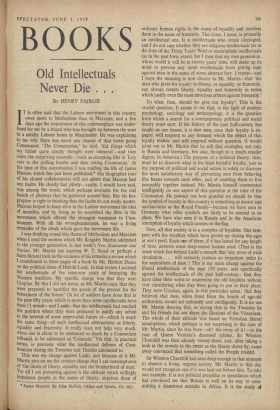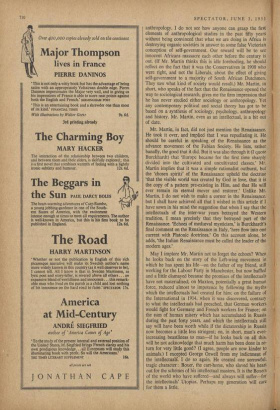BOOKS
Old Intellectuals Never Die . .
BY HENRY FAIRLIE IT is often said that the Labour movement in this country owes more to Methodism than to Marxism, and a few days ago the importance of this commonplace was under- lined for me by a friend who was brought up between the wars in a solidly Labour home in Manchester. He was explaining to me why there was never any chance of that home going Communist. 'The Communists,' he said, 'did things which my father quite simply thought were immoral'—and then came the surprising example—'such as accepting lifts in Tory cars to the polling booths and then voting Communist.' At the time of this conversation I was reading the life of James Maxton which has just been published.* His biographer (one of his closest collaborators) will not admit that Maxton had any faults. He clearly had plenty—vanity, I would have said, was among the worst, which perhaps accounts for the odd bunch of phoneys that he gathered around"him. But his bio- grapher is right in thinking that the faults do not really matter. Maxton helped to keep alive in the Labour movement the idea of morality, and by doing so he nourished the fibre in the movement which offered the strongest resistance to Com- munism. With all his wrongheadedness, he was a living reminder of the ideals which gave the movement life.
I was thinking round this theme of Methodism and Marxism when I read the sermon which Mr. Kingsley Martin addressed to the younger generation in last week's New. Statesman and Nation. Mr. Martin (an aspiring W. T. Stead or perhaps a Saint-Simon) took as the occasion of his'remarks a review which I contributed to these pages of a book by Mr. ,Herbert Deane on the political ideas of Harold Laski. In that review I accused the intellectuals of the inter-war years of betraying the Western tradition. My specific charge was that they were Utopian. by this I did not mean, as Mr. Martin says, that they were prepared to 'sacrifice the goods of the present for the betterment of the future.' (A lot of soldiers have done that in the past fifty years, which is more than some intellectuals have done.) I meant—and I said—that the intellectuals had reached the position where they were prepared to justify any action in the interest of some unprovable future or—which is much the same thing—of such intellectual abstractions as liberty, equality and fraternity. It really does not help very much, when one is about to be sentenced to death by a Communist tribunal, to be addressed as 'Comrade.' Yet that, in practical terms, is precisely what the intellectual defence of Com- munism during the Twenties and Thirties amounted to.
This was my charge against Laski, and because of it Mr. Martin pins on me the counter-charge that I am contemptuous of 'the ideals of liberty, equality and the brotherhood of man.' Yet all I am protesting against is the attitude which willingly Imprisons people in the name of liberty, deprives them of
• JAMEs MilocroN. By John McNair. (Allen and Unwin, 12s. 6d.)
ordinary human rights in the name of equality and murders them in the name of fraternity. The crime, I insist, is primarily an intellectual one. It is intellectuals who create ideologies, and I do not care whether they are religious intellectuals (as at the time of the Thirty Years' War) or materialistic intellectuals (as in the past forty years), but I trust that my own generation, whose world it will be in twenty years' time, will make up its mind to prevent any more intellectuals from pitting man against man in the name of some abstract fury. I repeat—and I hope the meaning is now clearer to Mr. Martin—that 'the man who gives his loyalty to liberty, or equality, or fraternity, can always restate liberty, equality and fraternity in terms which justify even the most atrocious crimes against humanity.'
To what, then, should we give our loyalty? This is the crucial question. It seems to me that, in the light of modern psychology, sociology and anthropology, it is the question from which a search for a contemporary political and social theory must start. If the history of the past half-century has taught us one lesson, it is that men, once their loyalty is en- gaged, will respond to any demand which the object of that loyalty makes, and will respond without question. (I would point out to Mr. Martin that he will find examples, not only in Russia and Germany, but also, though to a much smaller degree, in America.) The purpose of a political theory, then, must be to discover what is the least harmful loyalty, just as the purpose of political and social action is solely to discover the most satisfactory way of preventing men from behaving like beasts towards each other, and of enabling them to live peaceably together instead. Mr. Martin himself commented intelligently on one aspect of this question at the time of the Coronation. He pointed out how grateful we should be that the symbol of loyalty in this country is something as decent and unchauvinist as the Royal Family—because we have seen in Germany what other symbols are likely to be erected in its place. We have also seen it in Russia and in the American conception of loyalty which centres on the flag.
Now, all that society is is a complex of loyalties. One tam- pers with the loyalties which have grown up during the ages at one's peril. Each one of them, if it has lasted for any length of time, answers some deep-seated human need. (That is the sense which lies behind Laski's remark that 'any error of wide circulation . . . will certainly contain an important index to the aspirations of man.') This is my main charge against the liberal intellectuals of the past 150 years, and specifically against the intellectuals of the past half-century : that they have done their worst to undermine the old loyalties without ever considering what they were going to put in their place. They were Utopian, again, in this particular sense : that they believed that men, when freed from the bonds of age-old authorities, would act rationally and intelligently. It is no use Mr. Martin denying this, or saying that in the Twenties he and his friends did not share the illusions of the Victorians. The whole of their attitude was based on Victorian liberal assumptions, which perhaps is not surprising in the case of Mr. Martin, since he was born—oh! the irony of it ! —in the year of Queen Victoria's diamond jubilee.. Sir Winston Churchill was then already twenty-three, and, after taking a look at the crowds in the street as the Queen drove by, came away convinced that something called the People existed.
Sir Winston Churchill had seen deep enough in that moment to observe a living, organic society. Mr. Martin to this day would not recognise one if it was laid out before him. To take one example. It is not political prejudice or speculation which has convinced me that Britain is well on its way to com- mitting a disastrous mistake in Africa. It is the study of
a
anthropology. I do not see how anyone can grasp the firs elements of anthropological studies in the past fifty year. without being convinced that what we are doing in Africa i destroying organic societies in answer to some false Victoria, conception of self-government. Our reward will be to see innocent Africans massacre each other before the century i out. (If Mr. Martin thinks this is idle foreboding, he shouk reflect on the fact that it was the Conservatives in 1908 wht were right, and not the Liberals, about the effect of giving self-government to a majority of South African Dutchmen They saw what kind of society would result.) Mr. Martin. it short, who speaks of the fact that the Renaissance opened till way to sociological research, gives me the firm impression tha he has never studied either sociology or anthropology. Ye any contemporary political and social theory has got to hi based on a synthesis of sociology, psychology, anthropolog: and history. Mr. Martin, even as an intellectual, is a bit ou of date.
Mr. Martin, in fact, did not just mention the Renaissance He took it over, and implied that I was repudiating it. HI should be careful in speaking of the Renaissance as till advance movement of the Fabian Society. He lists, rathe banally, the good that it did. But it was also through it (I quote Burckhardt) that 'Europe became for the first time sharp]] divided into the cultivated and uncultivated classes.' Mr Martin implies that it was a simple rationalist outburst, bu the 'chosen spirits' of the Renaissance upheld the doctrine 'that the visible world was created by God in love, that it i the copy of a pattern pre-existing in Him, and that He wil ever remain its eternal mover and restorer.' Unlike Mr Martin, I do not wish to make a corner in the Renaissance but I shall have achieved all that I wished in this article if have sown in his mind the suggestion that when 1 say that the intellectuals of the inter-war years betrayed the Wester] tradition, I mean precisely that they betrayed part of the Renaissance. 'Echoes of mediaeval mysticism,' is Burckhardt' final comment on the Renaissance in Italy, 'here flow into one current with Platonic doctrines.' On this account alone, hi adds, 'the Italian Renaissance must be called the leader of thi modern ages.'



































 Previous page
Previous page